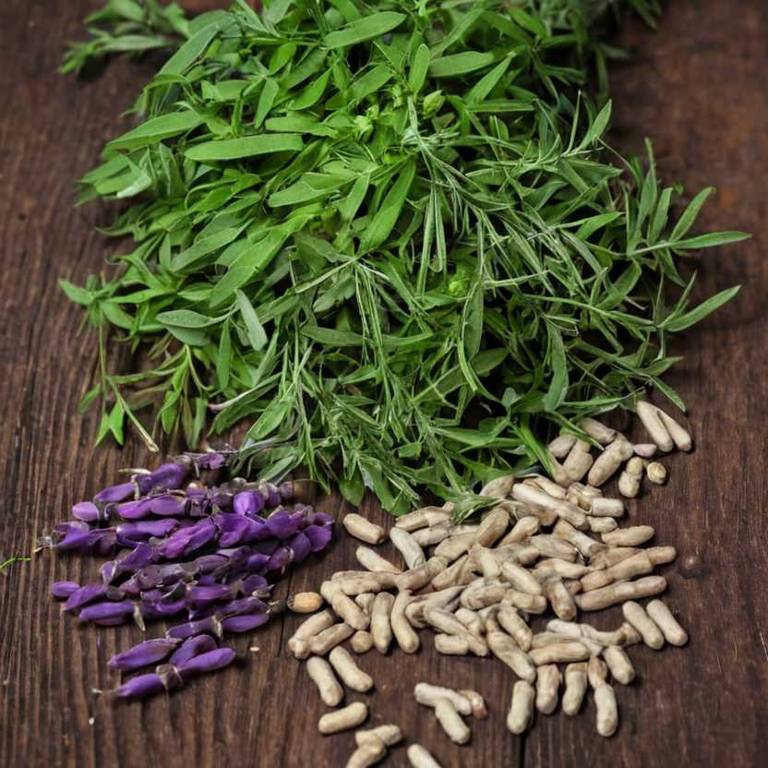Broad Bean (Vicia faba)
Broad Bean (Vicia faba) is a member of the Fabaceae family, native to Europe, North Africa, and West Asia. Traditionally, its leaves, seeds, and shoots have been used for culinary uses, decoctions, and infusions.
This herb is particularly valued for its anti-inflammatory, bitter, and diuretic actions, and has a long history of use in european herbal medicine, mediterranean herbal traditions, and traditional chinese medicine.

Quick Facts / Key Information
| Common Name | Broad Bean |
|---|---|
| Scientific Name | Vicia faba |
| Plant Family | Fabaceae |
| Genus | Vicia |
| Species | faba |
| Native Range | Europe, North Africa, West Asia |
| Plant Parts Used | Leaves, Seeds, Shoots |
| Primary Medicinal Actions | Anti-Inflammatory, Bitter, Diuretic |
| Primary Traditional Systems | European Herbal Medicine, Mediterranean Herbal Traditions, Traditional Chinese Medicine |
| Historical Preparation Methods | Culinary Use, Decoction, Infusion |
Botanical Identity
- Scientific Name
- Vicia faba
- Common Name
- Broad Bean
- Synonyms / Alternative Names
- Fava Bean, Egyptian Bean, Borlotti Bean
- Plant Family
- Fabaceae
- Genus
- Vicia
Botanical Description
- Growth Habit
- Perennial herbaceous plant.
- Height
- It typically grows to a height of 0.3 to 1.5 meters.
- Leaves
- Broad, flat leaves with upper surface dull green and lower surface pale green, featuring prominent stomatal bands along the midrib.
- Flowers
- Flowers are zygomorphic, yellow with purple markings, arranged in racemes, each flower having five petals with two lips, two stamens, and a single pistil.
- Stems
- Woody, cylindrical, pubescent stems with opposite branching, ascending growth habit, and prominently vascular bundles visible in cross-section.
Traditional Uses / Historical Use
Traditional Systems
- European Herbal Medicine
- Mediterranean Herbal Traditions
Historical Preparation Methods
- Culinary Use
- Decoction
- Infusion
- Powder
Medicinal Actions
- Anti-inflammatory
- Historically regarded as a calming anti-inflammatory, in tissue-soothing contexts.
- Bitter
- In herbal texts, considered a moderate bitter, for digestion-related formulations.
- Diuretic
- As described in traditional systems, a mild diuretic, in cleansing-oriented uses.
- Tonic
- In herbal literature, noted as a gentle tonic, for broad-use formulations.
Active Compounds
- Flavonoid
- Plant-based polyphenolic compounds frequently distributed throughout aerial plant parts.
- Phenolic Acid
- Naturally occurring phenolic compounds present in many plant species.
- Tannin
- A group of compounds frequently present in plant tissues exposed to herbivory.
- Coumarin
- A group of secondary metabolites present in seeds, roots, and leaves.
Modern Research Overview
Contemporary research on this plant includes areas such as chemical analysis, laboratory-based studies, and observational research. Detailed summaries of published findings are not included at this stage and will be added during future content updates.
Safety & Contraindications
- General Precautions
- Some general precautions have been associated with the use of this herb.
- Contraindications
- Reported information suggests that this herb may be contraindicated in specific circumstances.
- Allergies
- Sensitivity reactions have been noted in certain individuals following exposure to this herb.
- Drug Interactions
- The potential for interactions with prescription medications has not been extensively studied.
- Toxicity
- The toxicity profile of this herb has not been clearly established.
- Pregnancy & Breastfeeding
- Safety during pregnancy and breastfeeding has not been well documented.
Preparation & Usage Methods
- Infusion
- Infusions are commonly prepared using hot water to release aromatic and soluble components.
- Decoction
- Decoctions are made by heating plant material in water for an extended time.
- Poultice
- Fresh or dried plant material is applied externally to the skin.
- Culinary Use
- A preparation involving the use of plant parts in cooking or food production.
- Powder
- Powdered preparations use finely milled plant parts.
Growing, Harvesting & Storage
Growing / Cultivation
- Soil
- Prefers loamy soil with moderately well-drained conditions. Typically grows best in nutrient-rich soils.
- Sunlight
- Thrives in full sun. Tolerates full sun to partial shade.
- Watering
- Prefers moist soils. Tolerates periodic dry conditions.
Medical Disclaimer
The information provided on this page is for educational and informational purposes only. It is not intended to diagnose, treat, cure, or prevent any medical condition. Always consult a qualified healthcare professional before using any herb for medicinal purposes.